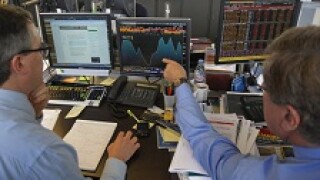Clawback
-
The CEO of HKEX may be keen for Saudi Aramco to list in Hong Kong but as our columnist Clawback explains, there are more reasons for the Saudi oil giant to bypass the city’s exchange than to pick it for a listing.
-
The filing of form S-1, the draft registration statement for the proposed $3bn New York IPO of Snap, the $25bn parent company of messaging app Snapchat, was full of surprises — not all of them good for investors. If anything, it also showed that Hong Kong will, most likely, never be able to compete with the US exchanges when it comes to listing unicorns, writes our columnist Clawback.
-
Thirty-first of December was not only the last day of a decidedly subdued year, but also the deadline by which Credit Suisse bankers in London were allegedly asked to return the mobile phones issued to them by their employer. This is only the latest nail in the coffin of a profession once seen more as a lifestyle, but which has now become (almost) like any other, writes our columnist Clawback.
-
Or so the saying goes. Not in China, it seems. Breaking the news that a bulge bracket firm in Hong Kong is suing a Chinese SOE client for non-payment of fees, our columnist Clawback says doing business in China is now little more than a league table exercise.
-
Hong Kong’s IPO sponsors are in the spotlight for all the wrong reasons as Standard Chartered and UBS face investigations by the city’s regulator. As a former IPO banker and joint author of the study manual for sponsors, our columnist Clawback is perfectly placed to delve into the pitfalls for banks.
-
The speed at which Chinese financial firms have made a significant dent in the investment banking profits of bulge bracket banks has even surprised Clawback.
-
Clawback turns his focus to cornerstones. Once a useful tool for creating demand, the process has morphed into a kind of insurance policy for IPOs, writes Philippe Espinasse.
-
This month, a recent announcement by the Hong Kong Stock Exchange (HKEX) in relation to one of its listing rules caught the attention of columnist Philippe Espinasse, who has put the regulation under the microscope.
-
Just a few weeks apart, announcements were recently made by the Stock Exchange of Hong Kong (HKEX) and Singapore’s SGX respectively about changes to front line regulatory functions they perform. The approaches under these proposals couldn’t have been more different, writes Philippe Espinasse.
-
Part science, part art, part mystery: our columnist takes a closer look at the process of allocating deals to investors.
-
As the $100bn-plus IPO of Saudi Aramco nears its launch, the UK’s Telegraph has most recently hinted at a three-way foreign listing, conducted across London, New York and Hong Kong. Columnist Philippe Espinasse looks at the practicalities and advantages (as well as disadvantages) for the oil behemoth of listing in Asia.
-
Having left investment banking a while ago, I’m baffled by the increasingly arcane and complex rules that now plague the business — the Chinese Mainland being a particular case in point, writes Philippe Espinasse.










